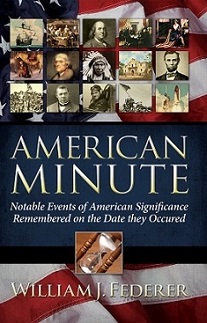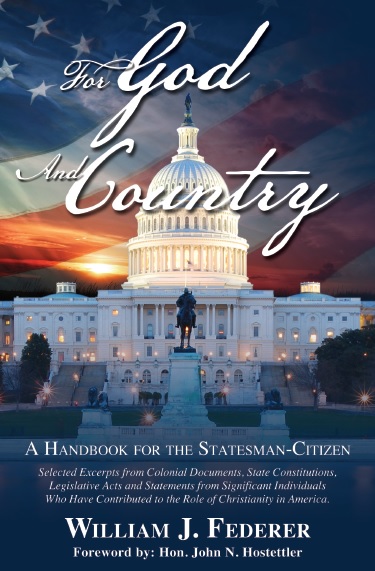The American Minute with Bill Federer: Prior to the Civil War, tariffs on imports into southern ports, notably Charleston, South Carolina, provided the majority of the revenue for the U.S. Federal Government.

A Federal income tax did not exist yet.

Tariff taxes on foreign made goods made them more expensive, causing people to buy domestically produced goods mostly from Northern factories.
Tariff taxes helped the North but hurt the South, as the South had few factories to protect.

Economically and politically, the South was dependent on agricultural, primarily rice and cotton.
Cotton was one of the largest industries in the world, and America’s leading export.
Before the Civil War, cotton exports from America’s southern states made up 77 percent of the 800 million pounds used in Britain’s textile industry.

Eugene R. Dattel wrote in “Cotton and the Civil War” (Mississippi Historical Society, July 2008):
“Cotton’s financial and political influence in the 19th century can be compared to that of the oil industry in the early 21st century.”

The South was dependent on cotton, which, unfortunately, was dependent on slave labor.

In the 1850s, bumper crops of cotton were sold to Britain, resulting in it having a surplus inventory of over a million bales.
America’s export of cotton dropped from 3 million bales in 1860 to a only few thousand.

To compound the problem, the South mistakenly thought it could raise the price of cotton by creating a shortage, so 2.5 million bales were intentionally burned.
The price of cotton did rise from 10 cents a pound in 1860 to nearly $2.00 a pound in 1863-1864.

Instead of paying the higher price, Britain began to look for other sources for cotton, most notably from India, Egypt, and Brazil.
Soon there was a global glut.
The South’s economy experienced a downturn, compounded by the exhaustion of the soil.
Southern farmers struggled under growing debt, often borrowing on harvests two or three years into the future.
Struggling, the South threatened to stop collecting tariff taxes on imports.

Federal troops were sent to Fort Sumter in Charleston’s harbor to force them to collect the tariffs.
With fewer banks in the South, there were limited supplies of gold with which to back its currency.
When the war started, being short of money and credit, the Confederacy used cotton to barter for weapons and ammunition from British manufacturers, but President Abraham Lincoln enacted a naval blockade in April 1861.

Union forces eventually captured the southern ports, ending the trade of cotton for armaments.
Lincoln appointed Charles Francis Adams, the grandson of John Adams, as U.S. Minister to Britain where he helped convince England to stay neutral during the Civil War.
In the midst of this perfect storm, the radical republicans in the North demanded immediate emancipation of all slaves.
Pastors met with Lincoln pressuring him to emancipate the slaves.
On the western side of the Atlantic, prior to the arrival of Europeans, slavery existed with various tribes enslaving captives for labor, ritual sacrifice or cannibalism.
On the eastern side of the Atlantic, Muslim slave traders and Barbary pirates had enslaved an estimated 180 million Africans, as well as over a million Europeans.
In the 1600s, Britain sold a half-million Irish Catholics into slavery.
The first African slaves arrived in Jamestown, Virginia, in 1619, brought by a Dutch ship who had seized them from a Spanish ship. At first, they were treated as other indentured servants and freed after a period of servitude.
Slavery gradually became permanent and extended into the agriculture-based colonies of the South.
Through the influence of Quakers, Methodists and other Christian denominations, slavery was prohibited in 7 of the original 13 States at the time of the Revolution.

Jefferson’s first draft of the Declaration of Independence condemned King George III, as:
“He has waged cruel War against human Nature itself, violating its most sacred Rights of Life and Liberty in the Persons of a distant People who never offended him,
captivating and carrying them into Slavery in another Hemisphere, or to incur miserable Death, in their Transportation thither.
This piratical Warfare, the opprobrium of infidel Powers, is the Warfare of the Christian King of Great Britain.
He has prostituted his Negative for Suppressing every legislative Attempt to prohibit or to restrain an execrable Commerce, determined to keep open a Market where Men should be bought and sold, and that this assemblage of Horrors might want no Fact of distinguished Die.”

Jefferson described the slave trade as “the opprobrium (disgrace) of infidel Powers” — a reference to the infamous Arab Muslim slave markets, where for centuries, African slaves were bought from notorious markets and bazaars in Morocco, Algiers, Tripoli, Cairo, Constantinople, Timbuktu, Khartoum, and Zanzibar.

Muslims sold African slaves into Egypt, Arabia, the Persian Gulf, India, the Far East, the Indian Ocean islands, Ethiopia, Somalia, and finally, European colonies.

In 1807, the U.S. Congress passed an “Act Prohibiting Importation of Slaves.”
This was the same year Christian statesman William Wilberforce helped pass Britain’s “Act for the Abolition of the Slave Trade.”
The Second Great Awakening Revival fueled an abolitionist movement which led to 19 of the 34 States prohibiting slavery.
Most Southern families did not own slaves. Less than one-fourth of the southern white population held slaves in 1860.
With the Louisiana Purchase of 1803 adding 828,000 square miles and the Mexican Cession of 1848 adding 529,000 square miles, there was renewed effort by Democrats to expand slavery into the new territories.
Congress attempted to resolve the issue with the Missouri Compromise of 1820, but this was effectively repealed with Democrat Senator Stephan Douglas’ 1854 Kansas-Nebraska Act.
This led to the founding in 1854 of the Republican Party. Its original platform preserved marriage as one man and one woman and stood for ending slavery: “to prohibit in the Territories those twin relics of barbarism – Polygamy and Slavery.”
Tensions increased when Chief Justice Roger Taney, appointed by Democrat Party founder Andrew Jackson, issued his infamous 1857 Dred Scott decision.
This decision caused an uproar in the 1860 Democrat Party Convention, resulting in a split with 51 Southern Democrats leaving in protest and starting the Southern Democrat Party.
In the Presidential Election of November 1860, the candidates were:
-Stephan Douglas, Democrat;
-John C. Breckinridge, Southern Democrat;
-John Bell, Constitutional Union;
-Gerrit Smith, Liberty (Union) Party;
-Abraham Lincoln, Republican.
With the highest voter turnout in American history to that date, 81.2 percent, Lincoln won with only 39.8 percent of the vote.
Seven states seceded before Lincoln was sworn into office on March 4, 1861.

Jefferson had written in the Kentucky Resolutions of 1798:
“The several states composing the United States … delegated to that Government certain definite powers, reserving each state to itself, the residuary mass of right to their own self Government; and that whensoever the General Government assumes undelegated powers, its acts are unauthoritative, void, and of no force.”

Forty days after Lincoln took office, Union Major Robert Anderson received a demand from Confederate Brigadier General Pierre Gustave Toutant-Beauregard to surrender Fort Sumter:
“FORT SUMTER, S.C., April 12, 1861, 3:20 A.M. – SIR: By authority of Brigadier-General Beauregard, commanding the Provisional Forces of the Confederate States, we have the honor to notify you that he will open the fire of his batteries on Fort Sumter in one hour from this time. We have the honor to be very respectfully, Your obedient servants, JAMES CHESNUT JR., Aide-de-camp. STEPHEN D. LEE, Captain C. S. Army, Aide-de-camp.”

Union General Anderson refused, and at 4:30am, April 12, 1861, Confederate General P.G.T. Beauregard opened fire upon Fort Sumter, beginning the Civil War.
Shortly after the firing upon Fort Sumter, four more States seceded.

The Civil War was began with both sides expecting would only last a few weeks.

Dragging on into years, the Confederate Army had the advantage of better trained military leadership.
Being nearly unstoppable, they twice won battles at Bull Run, Virginia, just 20 miles from Washington, D.C.

Union troops had fled in panic to the fortifications of the U.S. Capitol.
American Minute – Notable Events of American Significance Remembered on the Date They Occurred
The tide of the war did not to turn until Lincoln claimed the moral high ground by recasting it as a war to end slavery by issuing the Emancipation Proclamation.
This caused European support for the Confederacy to evaporate, as no country wanted to be accused of supporting slavery.

On November 15, 1862, President Abraham Lincoln spoke with Pastor Byron Sunderland of the First Presbyterian Church of Washington, D.C.:
“If it had been left to us to determine it, we would have had no war.
And, going further back to the occasion of it, we would have had no slavery.
And, tracing it still further back, we would have had no evil …
On both sides we are working out the will of God.

… Yet, how strange the spectacle!
Here is one half of the nation prostrated in prayer that God will help them to destroy the Union and build up a government upon the cornerstone of human bondage.
And here is the other half equally earnest in their prayers and efforts to defeat a purpose which they regard as so repugnant to … liberty and independence …
And they are Christians and we are Christians. They and we are praying and fighting for results exactly the opposite.”

On March 4, 1865, in his Second Inaugural Address, just 45 days before his assassination, President Abraham Lincoln stated:
“Neither party expected for the war the magnitude or the duration which it has already attained …
Both read the same Bible and pray to the same God, and each invokes His aid against the other.

… It may seem strange that any men should dare ask a just God’s assistance in wringing their bread from the sweat of other men’s faces, but let us judge not, that we be not judged.
The prayers of both could not be answered.
That of neither has been answered fully.
The Almighty has His own purposes …
If we shall suppose that American slavery is one of those offenses which, in the providence of God … He now wills to remove,

and that He gives to both North and South this terrible war as the woe due to those by whom the offense came …
so still it must be said ‘the judgments of the Lord are true and righteous altogether.'”

President Calvin Coolidge, on May 25, 1924, at the Confederate Memorial in Arlington National Cemetery, Virginia, stated:
“It was Lincoln who pointed out that both sides prayed to the same God.
When that is the case, it is only a matter of time when each will seek a common end.
We can now see clearly what that end is. It is the maintenance of our American ideals, beneath a common flag, under the blessings of Almighty God.”
